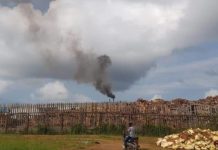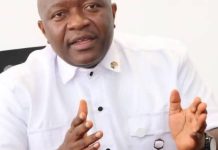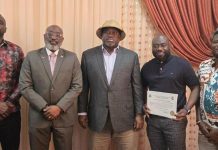Africa-Press – Liberia. The Bedrock of Sustainable Development
The pursuit of national development is often cloaked in complex economic theories, policy jargon, and ambitious projects. Yet, the most profound reality is strikingly simple: sustainable development depends on ensuring that citizens have meaningful earning opportunities, and that their income circulates effectively within the economy. This virtuous cycle, where work generates income, income fuels consumption, stimulates business, and business creates more work, is the engine of a thriving, self-reliant nation.
It is with this understanding that Liberia’s current government deserves commendation. The administration has articulated and embarked upon a comprehensive policy framework that addresses this simple reality head-on. Integrating revenue generation, macroeconomic stability, and local economic empowerment, the government has demonstrated a credible and actionable blueprint for a transformed Liberia. This is not merely a governance plan; it is a roadmap for building a resilient and inclusive economy where every citizen has a stake.
The government’s recognition that Liberia’s domestic revenue sources remain underutilized is a crucial acknowledgment of both a challenge and an opportunity. Current projections indicate a domestic revenue framework of approximately US$880 million, supplemented by US$200 million from investment contributions, and US$200 million from other sources.
While these figures reflect progress, they also underscore the need to mobilize untapped domestic resources. In a period of increasing governance credibility, the expectation for domestic revenue to assume a more dominant role is justified. The call for the Liberia Revenue Authority (LRA) and the Ministry of Finance and Development Planning (MFDP) to pursue deliberate, transformative, and innovative reforms is therefore both timely and essential, particularly given the country’s current macroeconomic stability.
A Transformative Revenue Framework-Unlocking Liberia’s Potential
The government’s proposed approach to revenue reform is a strategic masterclass in addressing both policy and administrative pillars of a modern fiscal state. By focusing on structural, long-term solutions rather than temporary fixes, Liberia is positioning itself for sustainable growth.
Tax Policy Reform
The targeted review of critical revenue streams, including Value Added Tax (VAT), Excise duties, and Real Estate taxes, reflects strategic thinking. By modernizing these areas, the government can capture greater value from economic activity without dampening growth incentives. Similarly, customs reforms covering importation, exportation, and the balance of trade are critical for revenue enhancement. Efficient customs operations not only increase government receipts but also protect domestic industries and facilitate legitimate trade, improving Liberia’s competitiveness in regional and international markets.
Tax Administration Strengthening
Effective revenue collection is the backbone of any sustainable fiscal system. In Liberia, despite progress in governance and macroeconomic management, domestic revenue mobilization remains below potential. Strengthening tax administration is essential to close this gap. Modernizing the Revenue Code ensures clarity, removes ambiguities, and aligns Liberia’s tax laws with best practices, including digital economy regulations. This legal modernization gives the Liberia Revenue Authority (LRA) operational autonomy, enabling it to enforce compliance, audit effectively, and reduce political interference, which is often a major constraint in many African tax administrations.
Decentralizing revenue collection is another critical step, ensuring all counties contribute fairly to national coffers and promoting inclusive development. Coupled with organizational restructuring and human capital investment, Liberia can create a more specialized and efficient workforce, capable of handling complex audits, taxpayer services, and compliance monitoring. Technological reforms, including an Integrated Tax Administration System and digital payment platforms, reduce leakages, enhance transparency, and improve efficiency.
Risk-based compliance, formalizing the informal sector, and anti-corruption measures further strengthen trust and voluntary compliance. Ensures regional and international cooperation initiatives, Liberia can capture revenue fairly from cross-border trade, preventing multinational profit shifting and promoting economic stability. Collectively, these reforms are vital for sustainable, equitable, and inclusive economic growth.
Budget Transparency and Reporting
A Critical pillar of Liberia’s economic reform agenda is budget transparency and reporting. Institutionalizing tax expenditure reporting, strengthening accountability mechanisms, and ensuring clarity in borrowing and spending practices, the government is implementing structural reforms that enhance fiscal discipline. These measures are designed to create a predictable and credible financial environment, which is essential for building citizen trust and encouraging voluntary tax compliance.
Such transparency reforms also improve the business climate by signaling reliability and good governance to investors. When financial flows are open and accountable, a positive feedback loop is created-increased confidence attracts investment, investment stimulates economic activity, and economic growth, in turn, generates additional resources for public development. This cycle reinforces inclusive growth and underpins Liberia’s broader strategy for sustainable economic transformation.
Sound Macroeconomic Policy-Enabling Growth
Liberia’s revenue framework requires complementary macroeconomic reforms to achieve sustainable and inclusive growth. Critical reforms include enhancing domestic production, expanding trade both locally and internationally, and strengthening supply chains to create meaningful employment opportunities, particularly for youth and women. Stabilizing inflation and deflation through calibrated monetary policy, exchange rate management, and price monitoring is essential to preserve purchasing power and ensure the effective circulation of income. These measures together create a macroeconomic environment that encourages investment, stimulates consumption, and reinforces the impact of revenue mobilization.
Fiscal and monetary reforms are central to long-term stability and investor confidence. The government must enforce fiscal discipline by limiting deficits, managing public debt prudently, and reforming the budgetary framework to align expenditures with strategic priorities. Coordinated monetary policies should enhance liquidity, incentivize productive investment, and control inflation. Additionally, a holistic development approach that leverages natural, human, social, manufactured, and financial capital will transform revenue into tangible improvements in living standards, economic resilience, and competitiveness, positioning Liberia for an upper middle-income future.
Creating Competitive and Sustainable Demand and Supply
The MFDP must initiate policies that reinforce the creation of competitive and sustainable demand and supply, positioning it as the engine driving market forces. By implementing initiatives that expand both local and international trade volumes, the government directly addresses the critical need for real earning opportunities. Promoting job creation and reducing unemployment empowers Liberians to earn, spend, and invest, creating a virtuous cycle of economic circulation that strengthens domestic markets.
Simultaneously, measures to balance inflation and deflation are essential to protect citizens’ purchasing power, ensuring that income retains its value and circulates effectively throughout the economy. Together, these policies not only stimulate economic activity but also lay the foundation for inclusive, resilient, and sustainable growth. To achieve this, Liberia must pursue structural, technological, and institutional reforms that enable both the private and public sectors to operate as dynamic partners in development.
These reforms should ensure that growth is not only strong but inclusive, driven by innovation, entrepreneurship, and transparent governance. When supported by efficient revenue systems, digital transformation, and regional cooperation, these measures can create a more competitive and self-reliant national economy capable of driving sustained prosperity for all Liberians.
Reforming Fiscal and Monetary Policies
Reforming fiscal and monetary policies are critical for Liberia as the country seeks to stabilize its economy and create conditions conducive to sustainable growth. Liberia’s current macroeconomic landscape is characterized by moderate revenue mobilization, reliance on external aid, and structural inefficiencies in public spending. Without disciplined fiscal management, these factors can lead to persistent budget deficits, unsustainable debt accumulation, and inflationary pressures, all of which undermine the confidence of investors and citizens alike.
The administration’s focus on establishing national fiscal discipline is therefore a strategic imperative. Controlling budget deficits, aligning government expenditures with strategic national priorities, and ensuring efficient allocation of public resources, Liberia can demonstrate prudent governance that reassures both domestic stakeholders and the international community.
A reformed expenditure framework is equally vital. It ensures that public funds are directed toward high-impact sectors such as infrastructure, agriculture, health, education, and job creation, which in turn stimulate economic activity and improve living standards. Linking fiscal policy with broader economic objectives, the government can create a predictable and stable investment climate, reducing risks for private sector participation and foreign investment. Moreover, effective monetary policies complement fiscal discipline by maintaining price stability, managing inflation, and ensuring liquidity in the financial system.
These reforms enable Liberia to attract capital, foster entrepreneurship, and sustain economic growth while protecting the purchasing power of citizens. Ultimately, reforming fiscal and monetary policies is not merely a technical exercise; it is foundational to creating a resilient economy, restoring public trust, and ensuring that development outcomes are inclusive and long-lasting.
Creating an Upper Middle-Income Economy
Achieving upper middle-income status in Liberia is far more than a question of increasing GDP; it demands a holistic approach to development that spans human capital, infrastructure, industrial capacity, governance, innovation, and social inclusion. Liberia must demonstrate that deliberate policy choices, fiscal discipline, and strategic investments in education, technology, and trade can transform the economy into one that is resilient, competitive, and capable of generating sustainable prosperity for all citizens.
A long-term vision to raise per capita income requires comprehensive development across all forms of capital: natural, manufactured, human, social, and financial. True economic wealth extends beyond mere cash accumulation; it is reflected in a skilled and healthy workforce, efficient and reliable infrastructure, sustainable management of natural resources, and a cohesive and inclusive society.
Unlocking and maximizing Liberia’s productive capacity across these dimensions, the government establishes a solid foundation for sustained, inclusive, and transformative economic growth.
Aggressive Local Investment and Inclusive Growth
Aggressive local investment and inclusive growth in Liberia require more than mere capital inflows; they demand deliberate and strategic policies, robust infrastructure, human capital development, and a business-friendly environment that empowers local entrepreneurs and fosters innovation. Linking domestic investment with skills development, technology adoption, rural inclusion, and regional integration, Liberia can generate sustainable economic growth that benefits all citizens, reduces inequality, and builds a resilient, self-sustaining economy.
While revenue mobilization and macroeconomic stability are essential foundations, they serve as means to a goal: inclusive growth that reaches every Liberian. The Ministry of Finance and Development Planning’s directive to implement an aggressive Local Investment Promotion campaign is therefore a critical strategic step. Complementary reforms in market and local development policies, combined with carefully calibrated liberalization and localization strategies, ensure that the business environment is both competitive and inclusive.
Privatization and market liberalization enhance efficiency and foster competition, while localization guarantees that Liberians remain the primary beneficiaries of growth. Additionally, cooperative development strengthens community-based economic initiatives, and targeted rural development programs bridge the urban-rural divide, ensuring that wealth creation and income circulation occur across the nation
Liberia Poised for Transformation
The government’s policy framework is coherent, bold, and highly commendable. It addresses the simple but fundamental reality of development: citizens must earn and invest in ways that drive inclusive economic growth. Strategically linking a transformative revenue agenda with disciplined macroeconomic management and a robust investment promotion strategy, Liberia is positioned to transition from potential to prosperity.
Implementation remains the ultimate test. Yet, with clear policy direction, stakeholder collaboration, and public trust, Liberia is poised for a historic chapter of transformation, one defined not by aid, but by achievement, not by dependency, but by self-sustaining, inclusive growth. For this visionary leadership, the government deserves the full commendation and support of all Liberians.
Source: Liberianobserver
For More News And Analysis About Liberia Follow Africa-Press






